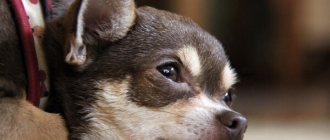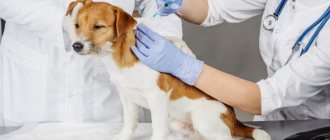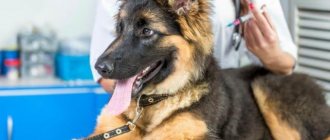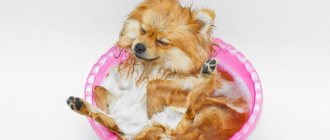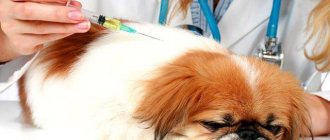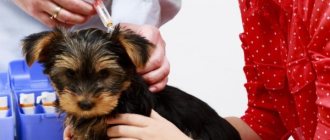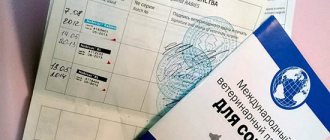Pomeranians have strong immunity, but the likelihood of viral and bacterial diseases is quite high. A dog can become infected without even leaving the house. Many of the diseases are deadly. The most reliable protection for Pomeranian puppies is vaccinations, which are administered strictly according to schedule and only after careful preparation of the pet. The dog owner should know what medications need to be used for vaccination, how to feed, walk and care for the puppy, and whether adverse reactions are possible.
Why do Pomeranians need to be vaccinated?
Vaccination is the introduction by injection or drops of weakened viruses or bacteria. Thanks to the immune response, the dog’s body “sees” them, produces antibodies and destroys the emerging threat. From one to two years, the Pomeranian Spitz remains protected from infections, after which revaccination is carried out.
If you do not get the necessary vaccinations, negative consequences are possible:
- The puppy can get sick, infect other dogs and die.
- If your Pomeranian has not been vaccinated and it bites someone, it will have to be quarantined for 10 days.
- The veterinary clinic may not accept you if there is no mark in the veterinary passport about mandatory vaccinations.
- Pomeranians will not be allowed to participate in exhibitions and competitions.
- Airplane travel within the country and abroad will be prohibited.
- Unvaccinated Pomeranians should not be used for breeding.
Feeding:
Up to 2.5 months - 6 times a day 2.5 - 3 months - 5 times a day 3-4 months - 4 times a day 4-6 months - 3 times a day From 6 months - 2 times a day
If not possible If you feed by the hour, then we leave the food until the evening, and the puppy will eat when it is convenient for him. It is advisable to feed either food or natural food. But if your pet tolerates mixed food well, then you can combine it. Soak food for up to 4 months!
If natural food
: Meat: beef, veal.
Chicken is undesirable (your eyes may water). No pork (digestion is impaired). The most useful meat product is beef or lamb unpeeled tripe - a storehouse of enzymes and microelements. Porridge: buckwheat, rice, rolled oats. Vegetables: carrots, also pumpkin, broccoli. I recommend letting you try a small piece of all the vegetables and fruits that you eat yourself. This way you will understand what the dog likes and what it doesn’t. Cottage cheese, kefir, fermented baked milk. If it is impossible to feed often, it is allowed to leave food until the evening. Chews - soft bones (hard ones will spoil the bite), carrots (they love them very much. Give them infrequently. Not digestible, but cleans teeth well) Absolutely not
: sweets (except in cases of hypoglycemia - lack of glucose in the blood, when the dog has a chill), fatty foods (there will be indigestion), smoked and fried (fraught with allergies).
Vitamins
for a puppy. For example: 1. Polidex Polivit calcium Plus - Polidex Polivit Ca + (for strengthening bone tissue and for general strengthening of the body, course 21 days every three months, especially during the period of changing teeth), 2. Artroglycan (for strengthening ligaments, course 21 a day once every six months, since Spitz knees are one of the weak points), 3. Brevers 8 in1 (brewer's yeast for wool, course 21 days every six months, especially during the molting period). Although I use "Brewer's Yeast with Sulfur" which is for humans. 4. Fish oil in capsules (in pharmacies for people) as a general tonic
What vaccinations do Pomeranians need to have?
Dogs are vaccinated against many difficult-to-treat diseases, but mandatory vaccinations for the German miniature Spitz and Pomeranian include:
- From distemper, an infectious disease that is deadly for puppies and adult dogs.
- From hepatitis - an acute contagious disease accompanied by fever, damage to the liver, respiratory and nervous systems.
- From parvovirus enteritis - inflammation of the intestines, stomach and complete poisoning of the body.
- From leptospirosis - a disease that affects capillaries, muscles, liver, kidneys.
- From rabies, a dangerous fatal disease that causes inflammation of the brain.
- From parainfluenza, a highly contagious infection that affects the respiratory system.
While puppies are breastfed, they receive immunity from their mother's milk; later, mandatory vaccinations according to age help protect pets from serious fatal illnesses and maintain health.
Vaccination schedule by age for Pomeranians
It is not necessary to vaccinate before puppies are two months old. From birth, they are protected by the natural immunity acquired through breastfeeding. After weaning from his mother, he gradually weakens, the owner needs to think about vaccination in order to preserve the health and life of the Pomeranian Spitz.
An approximate vaccination schedule looks like this:
| No. | Dog age | Vaccine |
| 1. | 2 months | Complex vaccination against enteritis, distemper, parainfluenza, leptospirosis and infectious hepatitis. |
| 2. | 3 months | Repeated vaccination. |
| 3. | 6 months | Repeated vaccination against the same strains. |
| 4. | 8 months | Rabies vaccination (given at 6 months in case of unfavorable epidemiological situation) |
| 5. | 1 year | Revaccination against enteritis, infectious hepatitis, plague, parainfluenza and leptospirosis. |
Experienced breeders recommend keeping a diary in which they record all the data about the Pomeranian, including the vaccination schedule developed together with a veterinarian, and follow it.
It is forbidden:
- leave the dog unattended on the sofa. There is a risk of fractures and dislocations when jumping. - allowing her to pull things - the bite will be spoiled, - letting her chew on large hard bones - the bite will be spoiled, choking, - feeding the dog from your table. It is especially forbidden to eat fried, smoked, sweet foods; overfeeding will cause them to sag in the pasterns, the position of the limbs, the position of the head, and movements will deteriorate; underfeeding is fraught with many problems. You need to feed the dog so that it goes to the toilet 1-2 times every knock. If more often - overfeeding. If less often - underfeeding or unbalanced nutrition.
Revaccination
During vaccination, weakened or killed pathogens of intractable infectious diseases are introduced into the animals' bodies. As a result, antibodies are produced that can fight pathogens. Over time, immune memory becomes weaker.
After the first vaccination, the Pomeranian needs to be revaccinated or reimmunized. The procedure allows you to maintain immunity and antibodies at the level developed by previous vaccinations.
Pomeranians are revaccinated at the age of 12 months and then annually at the same time.
Types of vaccines
According to the number of viral structures, vaccines are divided into:
- Monovalent: contain only one virus. The use of such a vaccine reduces the load on the puppy’s body, because the immune system is forced to fight only one virus, and not several at once.
- Polyvalent: the vaccine contains from 2 to 9 pathogens. When using them, a more convenient vaccination schedule is created.
- Live vaccines are a live virus, but weakened. Causes mild infection of the body.
- Dead vaccines contain dead viruses. They are more easily tolerated by weakened and sick animals, but do not form as strong an immunity as live vaccines.
In accordance with the state of the causative agent of the disease, they are distinguished:
How to prepare a puppy for vaccination?
Your puppy should be prepared for vaccination in advance. Anti-helminth medications are given two weeks in advance. In case of high infestation, deworming is repeated 10 days after the first treatment. If you do not rid your puppy of parasites before vaccination, allergic reactions, lack of the required amount of antibodies, or severe illness instead of the expected immunity are possible.
Before the vaccine is administered, the orange is treated against ticks, fleas and lice.
Three to four days before the procedure, you need to measure the puppy’s body temperature, do not overload it physically, do not change your usual lifestyle, and protect it from stress and travel. The pet is not fed on the day of vaccination.
Education and socialization.
Dear friends, we have carefully taken care of the correct heredity of your new friend and his adaptation to life in society at an early stage of development, however, what kind of relationship you will develop in the future and how socialized the dog will be depends ONLY ON YOU!
- 8.1. The most important thing that is required of you is to establish a completely trusting relationship with the puppy from the first day (we partially discussed this issue in paragraph 2 of this article). If your relationship is built on love, you will not have to make any additional efforts to achieve everything you want from your Japanese Spitz! This is a dog that does not require punishment to raise! The Japanese happily try to please in everything and please their owner. Their intelligence allows them to remember and carry out all your commands with one explanation.
- 8.2. The only points in the education of which you must show particular persistence and rigor are the categorical prohibition of picking up anything on the street or taking from strangers and crossing the curb of the road! How to do this correctly, if you do not have your own experience, is described in detail by many famous dog trainers in the world, the most important thing is to be patient and consistent! We do not recommend putting on a muzzle to stop picking up on the street, because for thinking dogs, consciously made decisions are the most effective.
- 8.3. If for some reason your pet’s relationship with you or someone in your family does not work out - giving your Japanese Spitz for personal lessons with an instructor is an ineffective activity, it would be more correct to take a course in teaching you how to communicate with a dog from a dog handler or animal psychologist. The second option is to undergo group OKD. (general training course) In this case, if you plan to engage in a show career, be sure to warn the instructor about this in order to exclude the “sit” command from the training. The third option is to do ring training with a handler. This will allow you to kill two birds with one stone, establish contact with your pet and prepare it for exhibitions. (we will talk more about exhibitions in the corresponding article) The last option is also the most effective for socialization!
- 8.4. The concept of socialization includes the dog’s adaptation to a situation that is unfamiliar and uncomfortable for it. Therefore, the more often you take your pet with you to a variety of different and noisy places, with large crowds of people and animals, the calmer and more adequate his behavior will be in the future. Believe me, even if at first the baby is scared and uncomfortable, then very soon he will get used to it and will be very grateful to you for taking him with you and not leaving him alone at home.
If you still have specific questions about animal psychology and behavior correction, as well as on any other points, do not hesitate to contact us for a more detailed consultation! We wish you only positive emotions from communicating with your new family member and a lot of happiness! With respect to all visitors.
The author of the manual is the head of the nursery Donik Style, Victoria Schislyaeva.
The procedure for vaccination at home
Pomeranians can be vaccinated at home. This can be done independently or by inviting a veterinarian. On the advice of a doctor, buy the vaccine at a veterinary pharmacy and store it in the refrigerator. She can stay outside it for no more than two hours. Immediately before the procedure, the pet is examined and its body temperature is measured.
The injection site is treated with alcohol, the ampoule is opened, the drug is drawn into a syringe and an injection is given subcutaneously or intramuscularly (depending on the instructions in the instructions).
Only a veterinarian can make a note in the passport.
Consequences and adverse reactions after vaccinations in oranges
Even if all vaccination rules are followed, complications are possible after vaccination - increased body temperature, swelling and pain at the injection sites. Most often, they disappear within three days without consequences.
If the symptoms are more serious, you should immediately seek help from a veterinarian:
- uncontrollable vomiting and diarrhea;
- loss of coordination and disorientation in space;
- the appearance first of a tumor, and then of suppuration at the injection site;
- increase in body temperature by more than 1 ⁰С;
- complete refusal of food, lethargy and loss of activity.
The presence of one or more symptoms may indicate an allergic reaction to the drug, a dosage violation, or a weakened Pomeranian.
In what cases is it better to postpone vaccination?
There are situations when the procedure should not be carried out as planned. Reasons why it should be postponed include:
- pregnancy or lactation period;
- skin rashes;
- bitch in heat;
- poor general condition;
- replacement of milk teeth with permanent ones;
- less than eight weeks old;
- increased body temperature;
- the need to take strong medications;
- allergy to the drug.
After consultation with a veterinarian, a new time for the procedure is set and full preparation for it is carried out.

